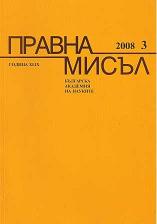Несъответствието с целта на закона като основание за оспорване на административния акт
Non-compliance with the Purpose of Law as Grounds for the Review of Administrative Acts
Author(s): Miroslav MirchevSubject(s): Law, Constitution, Jurisprudence
Published by: Институт за държавата и правото - Българска академия на науките
Summary/Abstract: The article analyzes one of the most difficult justifications for the appeal of administrative acts before the court: namely, incompatibility with the purpose of the law with regard to the relevant legislation and the various theoretical concepts. Compliance with the purpose of the law is a key requirement for the lawfulness of an administrative act; therefore whenever a public body has used a power for a purpose not allowed by the existing legislation, the court will repeal the act. The article deals with the limits of discretionary power and judicial review concerning the ascertainment of incompatibility with the purpose of the law. A judicial review is not concerned with the 'merits' of an administrative act, neither does it find out whether the public body has made the 'right' decision. The only issue considered by the court is whether the public body has acted unlawfully. In particular, it's not the court's task to substitute its judgment for that of the decision maker. Classical legal theory postulates that Judicial review over discretionary power must be limited to the outer borders of discretionary power. It also outlines five requirements for the lawfulness of an administrative act: 1. lack of competence, 2. infringement of substantive provisions, 3. infringement of essential procedural requirements, 4. infringement of the prescribed form and 5. incompatibility with the purpose of the law. Another legal theory regards judicial review over discretionary power as feasible in some borderline cases provided one follows strictly the theory about the separation of powers. The article illustrates the point with two cases of the Supreme Administrative Court. One should also differentiate between incompatibility with the purpose of the law and wrongful-ness/lack of rightness/which has been legally defined in the Additional provisions of the Administrative Procedure Code as abuse by means of discretionary power. Judicial review can take place when an administrative body acts in exercising mandatory administration in step with the classical approach. The author holds another theoretical concept according to which incompatibility with the purpose of the law in mandatory administration is a kind of misuse of power. In this particular case the grounds for judicial review should be infringement of substantive law. When the purpose of an administrative act is incompatible with law different legal consequences follow. This problem is not solved unanimously by jurisprudence or legal theory, either. In the majority of cases a court repeals the administrative act incompatible with the purpose of the law, but there are cases when a court will declare the act null and void. The author holds the following criterion for legal consequences: if the purpose of an appealed administrative act failed to be achieved through a lawful act of the same/another administrative body, then the act is void...
Journal: Правна мисъл
- Issue Year: XLIX/2008
- Issue No: 3
- Page Range: 12-24
- Page Count: 13
- Language: Bulgarian
- Content File-PDF

